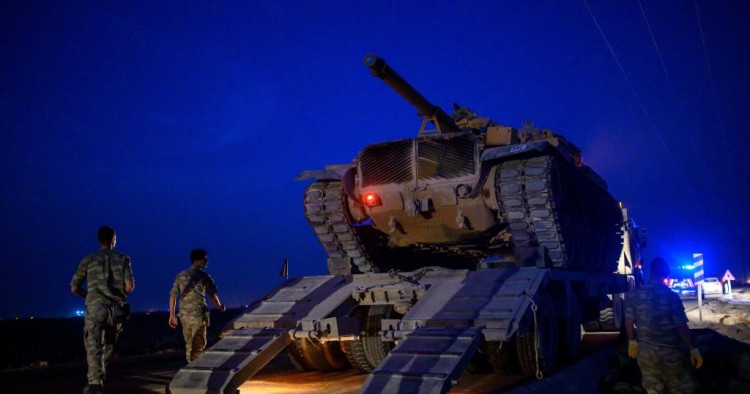The Turkish offensive into part of northeastern Syria is advancing only slowly, giving more space to Syrians and their foreign patrons to devise short-term diplomatic fixes. Turkey enjoys implicit support from Russia, which is gradually trying to woo Turkey away from its Western ties and ultimately wants the American air force and army presence in Syria abandoned. Russia’s ally in Damascus, however, has condemned the Turkish invasion, in part at least because it knows how hard it will be to expel the Turks later. Damascus would seek new resources from Moscow if its forces moved now to reoccupy eastern Syria in the wake of an American withdrawal, and Vladimir Putin may not be ready to provide them.
Donald Trump also wants not to pour more resources into Syria, while his Republican Party demands the American military operations continue in order to pursue ISIS remnants and protect the Syrian Democratic Forces (SDF) and its Syrian Kurdish leadership. Trump is embattled in Washington and over time Republican Party leverage over him will grow as the impeachment process moves forward. Trump likely doesn’t want to confront the Republicans over new legislation sanctioning Turkey for the incursion. Already he has tasked the State Department with trying to find the way to a ceasefire between the Turks and the SDF, according to a media report.
Recep Tayyip Erdogan has struck a defiant note toward the European Union, which also has threatened sanctions. With Turkey’s highly-leveraged economy weakening, and Erdogan’s ruling party losing local supporters, Erdogan is not in the strongest position. His idea to resettle tens of thousands of Syrian refugees in northern Syria will garner more condemnation as a violation of international humanitarian law, and without international support it will place large new burdens on the already-strained Turkish budget. The Turks will not try to occupy all of the territory under the control of the Syrian Kurdish-dominated administration in northeast Syria and will likely seek a pause once they cut the main road link between Syrian Kurdish communities farther east and those to the west of their incursion.
Before we get to that pause, Washington should consider its strategy. Erdogan brushed aside the good-faith effort of the U.S. military and the SDF along the border in September and early October. Short-term security has never been Turkey’s preoccupation with the evolving Syrian Kurdish mini-state. Rather, the mini-state itself is the issue for them; they worry about eventual Kurdish nationalism among their own restive Kurdish population. Their policy toward Iraqi Kurdistan is instructive. They came to accommodate the Iraqi regional government only after the Iraqi Kurdish leadership made clear its own hostility toward the Kurdistan Workers’ Party (PKK), and it pledged in the 2005 Iraqi constitution to remain a part of federal Iraq. Even so, the Iraqi Kurdish region sought an independence referendum in 2017 that Turkey strongly rejected. Meanwhile, pictures of PKK leader Abdullah Ocalan abound in the mini-state’s offices, and its dominant Kurdish party, the Democratic Union Party (PYD), is closely linked to the PKK. More security talks won’t solve the problem.
Rather, Washington has a hard long-term choice. It can’t stay in eastern Syria to chase ISIS remnants without at the same time providing a military umbrella for the PYD and its local allies building their mini-state in the northeast. No other regional state accepts that mini-state, and it will be a source of constant tension involving Syria and its allies, Turkey, and Iraq. By its nature our support for it drives Turkey toward Russia. If Washington chooses to remain in Syria to protect the SDF and their mini-state, it will have to keep U.S. forces in a conflict zone surrounded by enemies and their hostile security services for many years while it also tries to manage inevitable Arab-Kurdish frictions on the ground. There can’t be an eventual American exit plan because there is little hope of a political deal between the mini-state and the Syrian government, or the Turkish government. Those calling for a sustained American military deployment should be upfront about accepting this fact.
The choice of withdrawing from Syria opens the door either to long-term Turkish occupation of parts of northeastern Syria, which also will be destabilizing, or enabling the brutal Assad government, which itself is weak, to reassert wobbly authority in eastern Syria with local allies. Both would end badly for our friends in the SDF, especially its political leaders.
Neither withdrawing nor staying forever is ideal. In either scenario, while ISIS lacks the monies and credibility it had in 2013-16, it is poised to maintain its low-level insurgency across Syria as the country’s underlying political, economic, and social grievances won’t be quickly resolved. ISIS will remain in a weakened form for years. The long-term U.S. policy question is who will contain it in eastern Syria: the Americans, the Syrian government and its allies, or a combination of the Turks and the Syrian government. The best chance for an optimal solution to the Syrian crisis through a negotiated political deal that would genuinely reform the Syrian government in Damascus was lost years ago. Washington now must choose a policy which will yield only a “least-bad” result. We should at least be honest with our friends and ourselves about that.
Robert Ford is a Senior Fellow at MEI.
Photo by BULENT KILIC/AFP via Getty Images
The Middle East Institute (MEI) is an independent, non-partisan, non-for-profit, educational organization. It does not engage in advocacy and its scholars’ opinions are their own. MEI welcomes financial donations, but retains sole editorial control over its work and its publications reflect only the authors’ views. For a listing of MEI donors, please click here.













